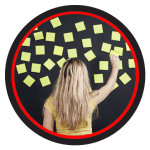State of Readiness
Maximize Your Memory
- Your brain is your most powerful organ, and has three main parts:
- Cerebrum: takes up the most space and is involved in remembering, problem solving, thinking, feeling, and controlling movement.
- Cerebellum: near the back of the head and is responsible for coordination and balance.
- Brain stem: connects the brain to the spinal cord and controls functions such as breathing, digestion, heart rate, and blood pressure.
- With each heartbeat, blood is carried to the brain for use by the brain cells.
- An adult brain contains about 100 billion nerve cells, with branches that connect at more than 100 trillion points.
- Signals traveling through the network form the basis of memories, thoughts, and feelings.
- Memories and thoughts move through an individual nerve cell as a tiny electrical charge.
- Nerve cells connect to one another at synapses.
- When a charge reaches a synapse, it may trigger the release of tiny bursts of chemicals called neurotransmitters.
- The neurotransmitters travel across the synapse, carrying signals to other cells.
Myths
- It’s all in our genes
- A big component of our lifelong brain health and development depends on what we do with our brains
- Expensive computer programs are required to improve our brains
- Every time we learn a new skill, concept or fact, we change our brains
- Brain exercise is only for seniors
- People of all ages can benefit from regular brain exercises
Facts
- Individuals who lead mentally stimulating lives, through education, occupation and leisure activities, have reduced risk of developing Alzheimer’s
- Studies suggest 35-40% lower risk (Cognitive Reserve and Alzheimer’s Disease: Sern, Y.)
- Brain can change, at any age
- Age-related cognitive decline typically starts at about 40
- Significant percentages of participants age 65 and older who trained for five weeks improved their memory, reasoning and information-processing speed – American Medical Association
3 Factors That Characterized Those Who Maintained Their Mental Abilities
- They were more mentally active
- They were more physically active
- They maintained a sense of effectiveness in the world
- They felt like they were contributing to the family and the world
- They generally felt good about themselves




